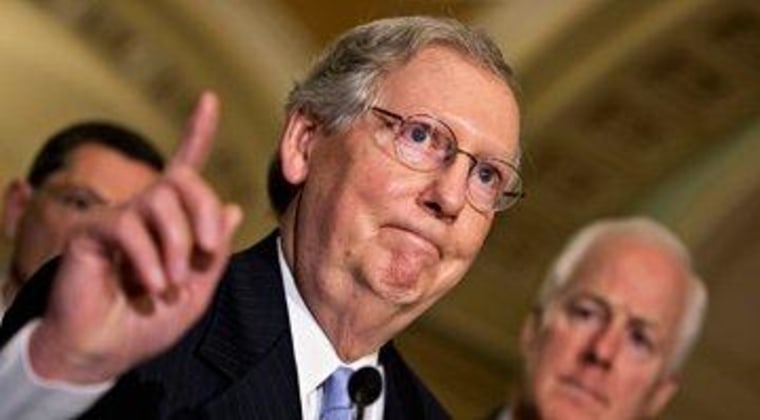In August, as Senate Republicans argued among themselves over budget strategies, their ostensible leader, Kentucky's Mitch McConnell (R), stayed on the sidelines. Worried that bold stands might hurt his re-election chances, the Senate Minority Leader was too afraid to take a stand.
In September, as GOP lawmakers have argued among themselves over U.S. policy in Syria, McConnell has again been afraid to lead. Yesterday, the Minority Leader didn't even want to be on the Senate floor for fear he might have to take a position on the issue of the day.
This morning, after carefully waiting for his pollsters to tell him what to say pondering the issue for three weeks, McConnell spoke up.
Breaking his silence on Syria, Republican Senate Minority Leader Mitch McConnell revealed Tuesday that he will oppose a resolution giving President Barack Obama the authority to unleash military strikes."I will be voting against this resolution -- a vital national security risk is clearly not at play" McConnell said in a speech prepared for delivery on the Senate floor that painted the White House strategy as muddled and rife with "unintended consequences.
McConnell added, "It's not exactly a state secret that I'm no fan of this president's foreign policy."
That's certainly true, though it's also not exactly a state secret that McConnell has spent his congressional career as a hawk, broadly supportive of using force abroad and backing military intervention to address national security crises.
So what changed? In case it's not obvious, McConnell is terrified of losing.
He has a credible primary opponent, an equal credible general-election challenger, and poll numbers that suggest McConnell is one of the least popular senators in the nation. It made for an easy calculus -- the Minority Leader will abandon his foreign policy principles because neither the president nor intervention in Syria are popular. Sure, it's craven to approach U.S. foreign policy this way, but McConnell apparently doesn't care.
This also, incidentally, creates an unexpected intra-party division -- the top two House Republicans (Boehner and Cantor) support the president's position, while the top two Senate Republicans (McConnell and Cornyn) do not.
